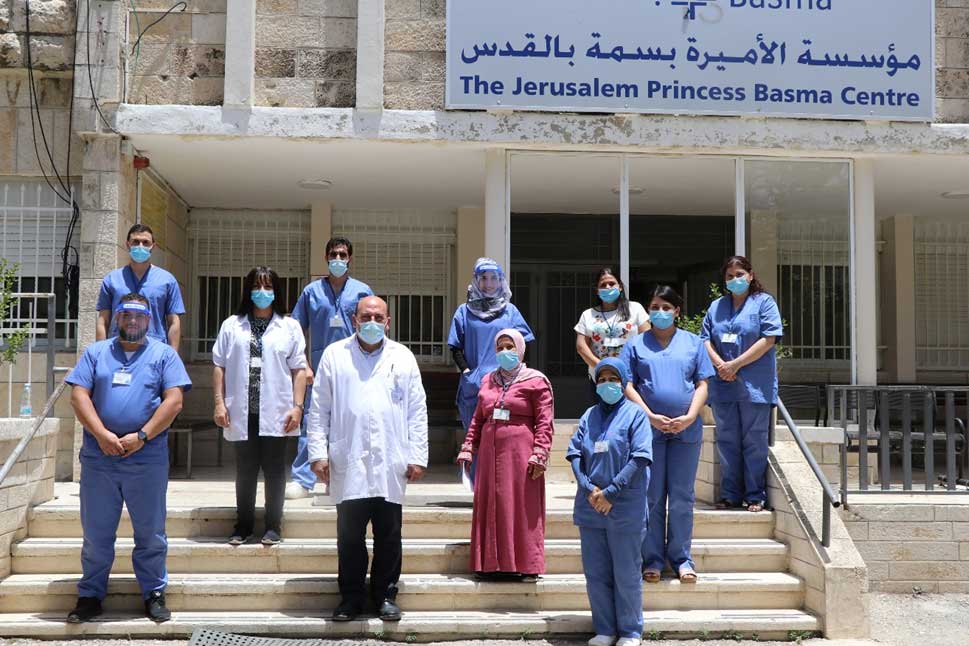Talking with Crosstalk just before Easter, Ibrahim Faltas, the general director of the Jerusalem Princess Basma Centre was worried about rising numbers of COVID-19 cases that were overwhelming hospitals in the West Bank and Gaza. Israel’s rapid vaccination of its population had not extended into the occupied territories yet.
Faltas described how the Centre had quickly adapted in the early months of the COVID-19 pandemic in order to continue to provide its vital rehabilitative services to children with disabilities from Jerusalem, the West Bank and Gaza.
“We used to have more than one patient in a room, but now we have separated our dormitory into individual rooms,” in the Centre’s inpatient program, he said. “We bring [groups of patients] all in one bubble and they leave in one bubble, so as to prevent any cross infection of the virus between them and our staff, who, thank God, are already vaccinated. But if this is going to increase, there is the risk that they will be infected in this bubble. And then we will have to, not shut down the operation of the inpatient [program], but send everybody home and then figure out how we would do this.”
That kind of adaptability and resilience is part of the Centre’s DNA. Faltas explained that a mother and family empowerment program evolved at the Centre 20 years ago. Many children needed ongoing therapy every day, but they could not be treated every day at the centre due to conditions of the military occupation and a lack of means. So while the children came for treatment, the staff trained the mothers to be shadow therapists to continue the therapy at home.
That system has been very successful and is still used, but the pandemic required more adaptations. It is a very intensive therapy program that requires mothers and children to be part of the inpatient program initially for assessment, diagnosis and the development of a customized plan of care, Faltas said. Children used to come to the Centre for 15 days and go home on weekends. “Because of COVID-19, we reduced it to 12 days, and it is continuous, so they don’t go back home during the weekend, they continue their therapies. … When they are referred to us by the Palestinian Ministry of Health, there isn’t enough financial coverage. The ministry of health will pay for 12 days once every few months but says it cannot pay for every day. So we do the intensive [therapies] with them and you see big progress happening.” Follow up used to happen through an outreach program in which therapists met the families in different partners centres throughout the territory.
At the start of the pandemic last year, “we stopped the inpatient from mid-March to mid-May, but we continued with the outpatient [care],” Faltas said. “We were forced to think how we could do things differently because some parents were afraid to show up even for outpatient.”
“Immediately we started to follow up with the patients virtually, especially in the West Bank.”
The staff found that there were some useful benefits to virtual follow-up visits. “You are in real time following up on the home program. You are doing the therapy with the mother or the father virtually through a video call to ensure that the therapies are done properly. So in this way, we make sure that we don’t break the therapy process for the child, especially [important] during their critical development ages,” Faltas explained.… “Making parents shadow therapists in this way, you see that you have maximized the impact on the child. Now, with the virtual therapy, we are even maximizing a little bit more.”
While the virtual therapies cannot replace the crucial inpatient program, Faltas said, “Our virtual therapy has taught us what are our possibilities, our capacities, what we can do, so definitely it is going to continue to be a component for follow up.”
Unfortunately, the Palestinian Authority has not recognized the virtual therapy and will not cover costs associated with it. “We fundraise in order to do the followup with the children in the West Bank,” says Faltas. “We are doing the ministry a big favour. We’re saving them money in a sense because if we do the virtual therapy it’s on us. Then if a child needs seven admissions during three years maybe the child will need only four because we have been doing virtual follow up.”
Funding is always a challenge for the Centre, which generates 75 to 80 percent of its income by selling services to the Palestinian Ministry of Health, to the Israeli Ministry of Health, to the Israeli medical funds (insurance companies). The Centre fundraises the remaining 20 percent (about $1 million) through the Anglican – Episcopal world, as well as other donors, both institutional and local individuals.
Asked what gives the staff the greatest satisfaction, Faltas said, “Definitely when a child reaches one of their targets.… A child will start to speak for the first time, a child will be able to walk for the first time, or to be able to use his or her hands, to be able to use a fork and eat, to make them independent. This is what we do…. These give a lot of joy to us and to our therapists.”
T
he Child Rehabilitation Centre is the heart of the Jerusalem Princess Basma Centre.
Children (from birth-15 yrs) with a range of congenital, neuromuscular and developmental disorders receive rehabilitation services, alongside social and emotional assistance.
Children from Jerusalem are treated on an outpatient basis; children from the West Bank and Gaza enroll in two to three-week residential programs.
For these patients, the Centre offers: physiotherapy, speech and language therapy, occupational therapy, sensory therapy, hydrotherapy, music therapy, therapies for autism and psychosocial support.
The Diocese of Ottawa will show its support for the Centre with a donation from funds raised on May 27 at the Bishop’s Gala.






Saint Mary’s Church, Westmeath — Deanery of the Northwest